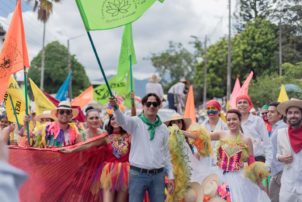
By Evi Declercq.
Local referenda swept Colombia after one village succeeded in using them to stop a massive mine. Until the Colombian constitutional court took their power away.
A small community in Colombia won a big battle one and a half years ago. Cajamarca voted 97 percent ‘No’ in a popular referendum about a planned mine from Anglo Gold Ashanti (AGA).
The argument that drinkable water is worth more than gold convinced all but a few. AGA left the territory and gave up the ‘La Colosa’ megaproject.
This David vs. Goliath story emboldened communities all over the country, giving them hope that they too might be able to protect their fertile lands against the extractive industry.
A wave of public consultations swept the country. That all ended on 11 October, when the constitutional court of Colombia decided to deny the right of communities to give a binding veto against mining.
Hard won rights are now under threat. “The sentence of the constitutional court is a major step back for the Colombian democracy,” says Renzo Alexander García, an activist in the national environmental movement of the country.
“Limiting the fundamental right to civil participation with regards to mining and oil extraction is against our own constitution.”
Renzo García adds: “It is clear how the extractive industry is taking over the court.
“Last year, three magistrates were replaced. The new president of the court is Alejandro Linares, a former vice-president of Ecopetrol, the Colombian national oil company. This is a corporate coup of state institutions.”
Development model
While former president Uribe aggressively sought for stability in economically valuable territories to attract foreign investors, president Santos chose a more diplomatic path to peace.
Important steps were taken to end the armed conflict in Colombia, but social and environmental movements call his peace a corporate peace. One type of conflict is replaced by another type.
In the past 8 years, 609 social, political and environmental leaders were killed. Many assassinations were motivated by corporate interests, to get rid of social movement leaders who oppose extractive projects.
In Colombia there are more than 200 social-environmental conflicts between companies and communities. Almost 30 percent of the documented conflicts turned violent.
They end up with displacements, killings, threats to leaders and the violation of both individual and collective rights. Consultation and binding referenda are fundamental to prevent these kinds of conflicts.
The impunity is shocking: 439 companies financed and supported armed actors during the conflict, a report of Dejusticia shows. None of these companies were judicialized or gave compensation for the victims of their actions.
When Duque, the new president of Colombia, visited Brussels on the 23th and 24th of October, Colombian and Belgian activists used the opportunity to let their voices be heard at the Schuman square in front of the European Commission.
Their demand is simple. ‘No more killings in Colombia’. They complain that the peace agreements are not fully being implemented and the killing continues under another name.
Mattijs Vandenbussche from Belgian activist group CATAPA said that “these conflicts can’t be seen separately from the model of development chosen by the Colombian government, under pressure from multinationals who want to extract Colombia’s resources.
The world watches the armed political conflict with FARC with anxiety but closes its eyes for the violence that is committed towards people trying to defend their way of life, their livelihood, their lands and their culture.”
Pessimistic about the current political developments, Renzo García calls for international solidarity. He also sees hope in a binding Treaty in business and human rights that is currently being discussed in the UN.
He added: “Another development model is possible. Colombia could be an example for the world and play a big role in combatting global food scarcity and climate change.
“The richness of the country isn’t to be found under the ground but in the incredible biodiversity, in the water sources, in landscapes, in agricultural production, in fair trade, in ecotourism, in the cultural diversity… “
The official war may be over, but peace still seems far away.
This Author
Evi Declercq is political scientist and freelance journalist. She is active in Catapa and is currently working at the EEB. This article first appeared in The Ecologist: https://theecologist.org/2018/oct/29/colombia-democracy-price-peace

The project ENVJUSTICE has received funding from the European Research Council (ERC) under the European Union’s Horizon 2020 research and innovation programme (grant agreement No. 695446)